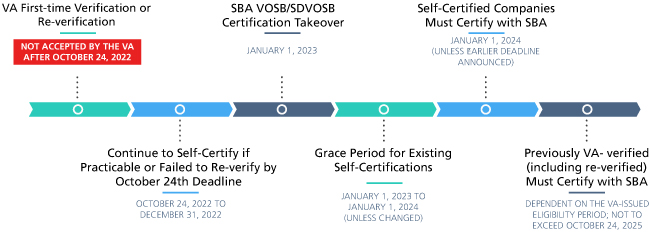The 2021 National Defense Authorization Act (NDAA) will soon implement changes to the veteran-owned small business certification process. Previously, qualified veteran-owned companies have been able to self-certify as a Veteran Owned Small Business (VOSB) or Service-Disabled Veteran-Owned Small Businesses (SDVOSB) through their System for Award Management (SAM) profiles to compete for government opportunities. Until these changes are fully implemented, VOSBs and SDVOSBs may continue to self-certify. Alternatively, SDVOSBs or VOSBs can apply for verification through the Veterans Affairs (VA) Center for Verification and Evaluation (CVE) to compete for VA contracts, including VA set-asides (known as VA verification).
The VOSB/SDVOSB certification landscape as we know it is changing due to a centralization trend over the last few years whereby certification, verification, and oversight are being streamlined and handed over to the Small Business Administration (SBA). As such, the self-certification and VA verification processes will formally conclude as of January 1, 2023, when the SBA takes over the vetting of VOSB/SDVOSBs.
As is usually the case with any new program, there is a grace period involved in the transition. For some VOSB/SDVOSBs, the grace period may end on January 1, 2024, and later for others. Notably, the SBA takeover does not invalidate that VA eligibility time period. VA-issued verifications will automatically roll over to SBA’s database as long as they are still valid by January 1, 2023.
Deadlines at a glance:

What does this mean in general?
Eligibility criteria for the VOSB and SDVOSB programs will not change. As a reminder, any potential action required and related time factors depend on the company’s certification method and status. Understanding the type of certification or verification your company has (i.e.; VA-issued verifications) and when it is set to expire is vital. It is also important to understand the target contracts and other business opportunities. Consider whether your company can sustain a competitive foothold with just a self-certification. If not and it’s more prudent to pursue VA and VA-set aside opportunities, then consider preparing for SBA certification sooner rather than later.
The SBA continues to post up-to-date information as it comes available, including an area for frequently asked questions.
What does this mean for you as a self-certified veteran-owned small business?
If your company is self-certified through SAM and wants to remain self-certified, you can do so through January 1, 2024 (unless the grace period is later changed), and no further action is required until that date. You may continue to participate in the SBA program for contracts at agencies other than the VA during the grace period. After January 1, 2024, to maintain any veteran-owned small business status, you will need to apply for SBA certification.
What does this mean for you as a VA-verified veteran-owned small business?
After January 1, 2023, verifications from the VA will transfer automatically to the SBA as long as the eligibility period has not lapsed (usually set for 3 years from the firm’s verification letter). If your business has a VA verification set to lapse before that date, then you need to re-verify with the CVE before October 24, 2022. If you fail to do this, you will have to self-certify before January 1, 2023, or apply to the SBA anew on or after January 1, 2023. Once your VA verification lapses, whether it is the original or the re-verification, you will have to apply for SBA certification.
As a reminder…
To qualify for the VOSB or SDVOSB programs, your business must:
- Be a small business according to SBA’s size standards
- Be at least 51% owned and controlled by one or more veterans or service-disabled veterans
- Have one or more veterans or service-disabled veterans manage day-to-day operations who also make long-term decisions
- For SDVOSB, veterans must have a service-connected disability
These eligibility requirements are not changing as a result of the SBA take-over. You can view the full eligibility requirements in Title 13 Part 125 of the Code of Federal Regulations.
If you have any questions about this legal update please contact the Government Contracts group.




